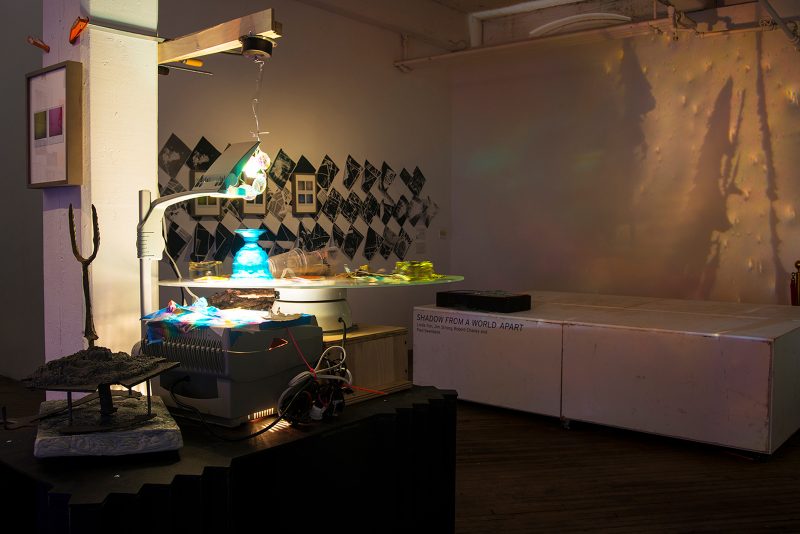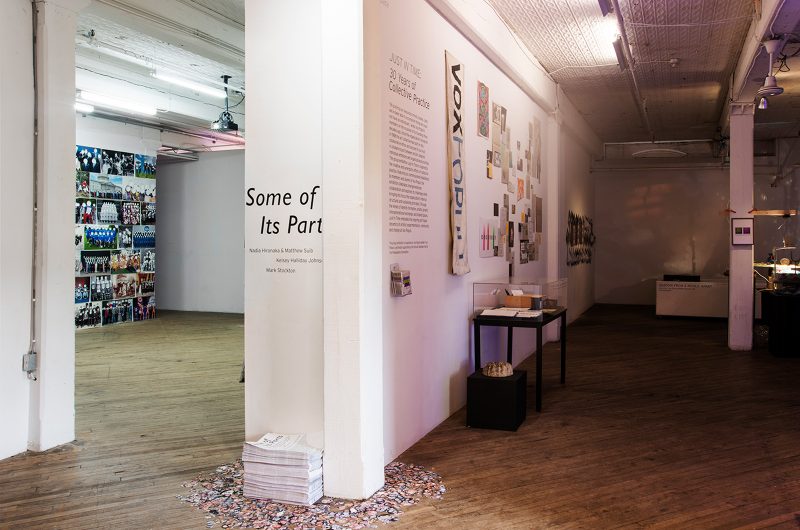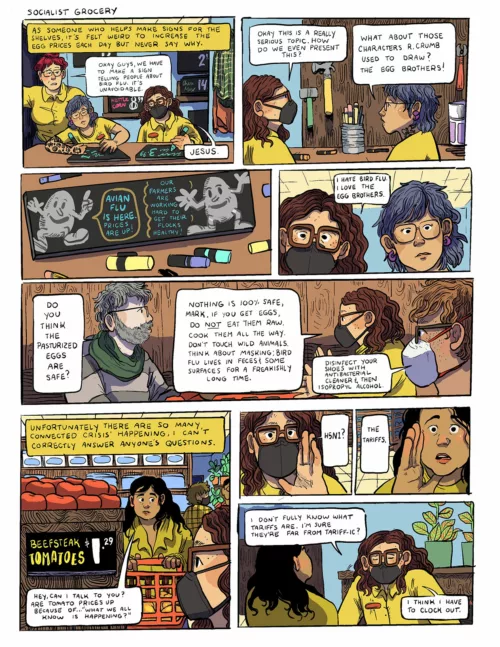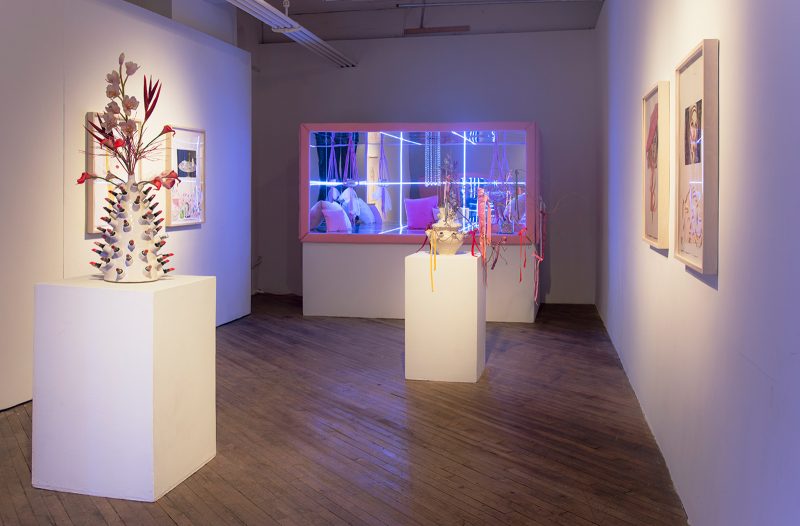
“IMPERFECT – That’s why we love it”
by Jacque Liu, Tina Plokarz, and Li Sumpter
With thanks to social scientist Mary F.E. Ebeling
In December 2018 Vox Populi entered its 30th year of existence. In celebration of three decades of artistic practice, Vox exhibited a series of collaborative installations that celebrated the collective’s spirit through the lenses of identity formation, artistic growth, intergenerational exchange, and shared spaces. While discussing our curatorial intentions, we turned our attention towards an investigation of the effects the collective may have had on the artist’s practice. To better understand this, we surveyed past and present Vox members. The questions were specifically framed to encourage anecdotes and hidden knowledge – thinking that many of these nuances could be captured in story and shared experience.
“Trust that Vox has a lot to give in return.”
(Chloe Reison, alum and current board member)
There are struggles, let’s be real. Not only is everyone unpaid, everyone is paying to be part of Vox. As such, one feels rightfully entitled to an equal say in every aspect of the art collective. But democracy, to paraphrase Susan Buck-Morss*, is by necessity an unfinished project and, as practiced within art collectives, can be an odd thing. Artists, by nature, are creative and generous, but few have experience in self-governance within a community. Yet as members of a collective, they share the same goal: to deliberately foster a space for experimentation, negotiation, and shared vision. Sometimes, unspoken expectations would expose a gap between how one works individually and within a collective, creating dissonance. Alum Robert Chaney recalls, “Vox was one of my first exposures to large group decision-making. I learned a great deal about shouldering and sharing responsibility.”
Yet the artwork made within the artist collective is almost always magical. It is rigorous, honest, and beautiful. Nearly every show speaks volumes in some eloquent manner about a subject that is very important to that individual, and likely to many others in the public. It offers an insight or reflection that investigates something which one was unable to acknowledge before experiencing the show. With an average of four shows a month over 30 years, equaling over 1,400 shows, that is a lot of deliberation and insight. “I am interested in the power a collective group of people have to imagine and create a place to empower projects, artists, and values in which we believe,” explains current member Kristine Rumman. “There is a power in numbers!”
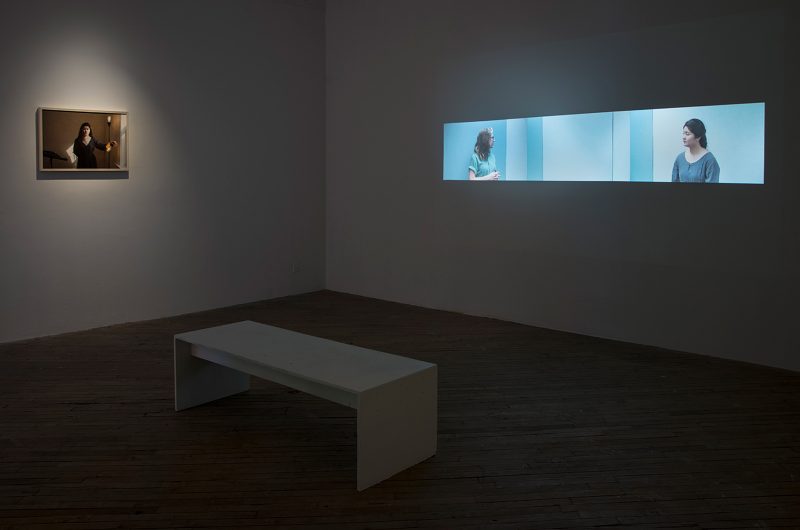
Nostalgia, ad nauseam
As we observe Vox’s membership, many of the conflicts from then are similar to those today. That is not to say that these problems should go away – they are intrinsic to the environment. The overwhelmingly positive responses became ad nauseam, clearly nostalgic. The ad nauseam, though, was paradoxical – it was clear that, while many felt this way, few actually expressed it to each other. There were some apathetic responses and a few flashpoints of intense drama, but even the most bitter reflected upon their time at Vox with warmth and presented generosity as among the most important pieces of advice. “Imperfect – that’s why I love it.” The title of this essay is paraphrased from alum James Johnson’s musings.
So, how do these small communities affect the individuals and their art practices? What is it about them, what is it about Vox Populi, that so clearly makes it worthwhile to continue in its existence?
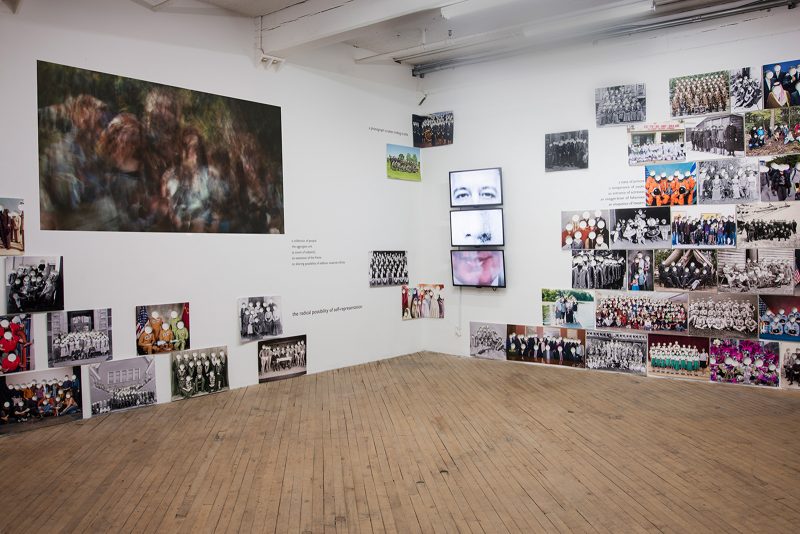
Growing community
Despite the diversity of the former and current members, several words appeared throughout the responses: work, gallery, community, time, practice, exhibition, artists, space, collective, group, learned, wanted, involved, helped, worked, friends, everyone, group, good, cooperative, together, making, energy, engaged, different, and place.
Many came to Vox looking for a community of like-minded artists and art professionals that support each other and grow through the firmament of a collective. While some struggled with the organization’s reputation, they understood that they were entering a dynamic DIY community of peers, mentors, and supporters that offered them the possibility of collective reimagining, solidarity, and empowerment. Being within Vox’s community it forced members to learn how to listen to each other, to communicate openly, and to allow criticism. “Vox helped me grow personally,” reflects alum and former director Andrew Suggs. “I grew to understand more clearly the power of coalition and collective action; I learned about consensus building and compromise; I practiced giving and receiving constructive feedback; I learned how to look at and talk about artwork.” A repetitive theme: despite miscommunications, most understood that feedback was usually given with the community in mind. These precepts reflected a desire to guide and to improve one another as empathic individuals as well as accountable community members. “Many voices are heard and it means finding solutions that may not be the most obvious but that perhaps are better for the long term. I have been learning to listen more and learn from those around me,” assesses member Julia Staples.
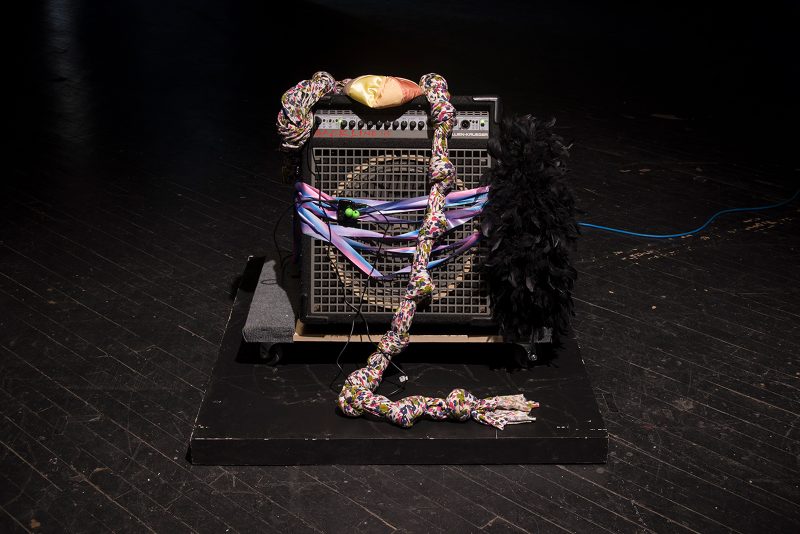
Humble ambition
Within the Vox community, a myriad of friendships, networks, partnerships, and even marriages have grown – humbly honoring the numerous liberating conversations in which “friends can become family,” even though “families are sometimes hot messes,” explains alum Linda Yun. “I was afforded the time, space, friendship, and support to develop my own voice with confidence, while also extending the same courtesy for many others within and beyond the membership.” Courageous yet responsible, they have balanced organizational priorities against their individual ambition and professional development.
The sensibility from these responses reflects an authentic desire to help each other succeed. This is significant. Working within a community is always fraught. But when one gathers artists with genuine community goals, there is an unprecedented amount of creative problem-solving skills to become collaborators and instigators with a strong can-do ethos and a get-out-of-your-comfort-zone attitude. Founding member Jenni Desnouee advises, “Your ideas are only as great as your own work ethic and willingness to implement them.” Indeed, nearly all respondents recalled a community of listening, challenge, and encouragement; musing upon their time at Vox as instrumental to their creative development and personal growth. Vox provided it’s community with practical learning experiences, which nearly all respondents noted ended up playing a crucial role in future professional successes and personal friendships.
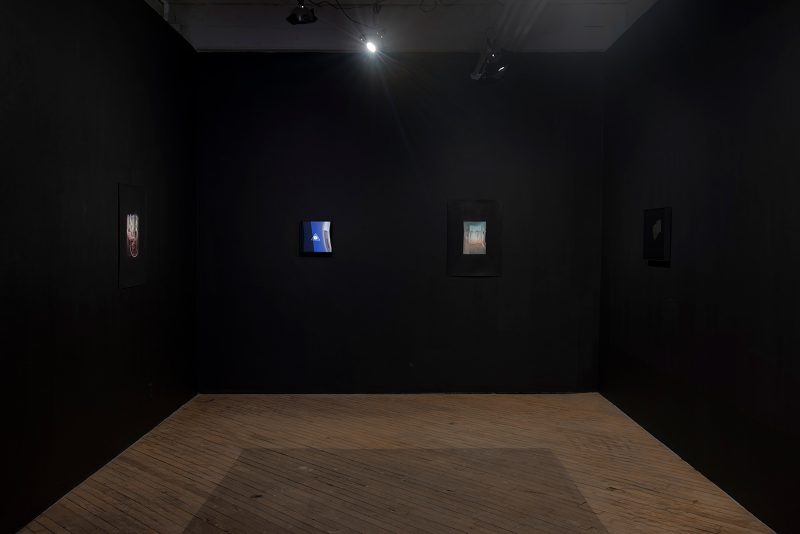
(Art) collective destiny + the individuation of The Artist
The surveys collected point to an ironic alchemical byproduct of Vox’s collective process, the individuation of The Artist. By Carl Jung’s theory, individuation is the process through which one becomes distinct, a separate entity. Could it be one enters the machine of the collective to be spit out the other side a more clarified creative with a signature aesthetic, a singular vision that is uniquely one’s own? This might be where the true boon lies. This could be the elusive reward for those who dare to embrace the chaos and dig deep into the work they came to do. It seems if the Vox members can commit to pushing beyond ego and self-doubt while working through and around the frustrations and limitations of the collective dynamic, they stand a chance at bearing witness to their own process of becoming the artist/curator/creative they were destined to be.
Almost every member (past or present) who arrived at Vox’s door was at the beginning or end of a given chapter in their life. For so many wandering souls and creative spirits, Vox was and apparently, still is an oasis on the outskirts of Limbo Land – that liminal, experimental space somewhere between art school and a dedicated practice, between a successful career and art dreams deferred. Today, Vox stands ever real and resilient in theory and in practice – a bridge between an impossible, arduous vision and its physical, logistical execution.
Vox Pop Redux
Words, like symbols and images, have power. Names and titles are words chosen or given with intent. They carry meaning, resonate identity and can even prophesy the future. No doubt, the name of this beloved and most resilient collective was chosen with an auspicious vision in mind.
Vox Populi – Voice of the people. The opinion of the majority.
These brief definitions speak to the collective’s founding spirit and bold ambition. Vox Populi speaks to the inherently political, the democratic. The egalitarian. These words align with Vox’s heritage, the shifting tides of present times and with local and global movements on the rise. An art collective that chooses such a name, an artist that elects to join such a membership, must know (or will inevitably learn) they must accept an often messy, sometimes magical mission – one undeniably steeped in trial and triumph.
If Vox Populi remains unapologetically honest with itself and true to its namesake, there is no telling what individual and collective visions could be realized in the decades to come.
Vox Populi, 319 N. 11th St., 3rd Floor, Philadelphia PA 19107
*Buck-Morss, Susan. “Democracy: An Unfinished Project.” Boundary 2, vol. 41, no. 2, May 2014, pp. 71–98.
More photos
